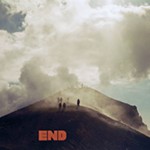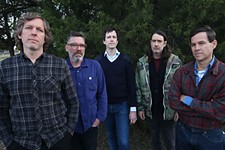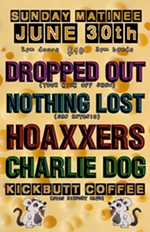Catastrophe and the Cure
The triumphant saga of Explosions in the Sky
By Austin Powell, Fri., July 1, 2011

Each member of Explosions in the Sky is branded with the same emblem: the black outline of an angel tattooed on his inner left wrist.
"The one visible tie that bonds," nods guitarist Munaf Rayani.
Lifted from the cover of 2001's Those Who Tell the Truth Shall Die, Those Who Tell the Truth Shall Live Forever, the figure in David Logan's painting pays homage to the Angels of Mons, a heavenly vision reported by British soldiers in the First World War. Troops credited the celestial guardians for their protection from advancing German forces, but on the album the image is rendered ambiguously – a lone cherub with arms outstretched, caught between destruction and deliverance.
"Like those soldiers, we felt like we were seeing something at the time that no one else was seeing," offers guitarist Mark T. Smith of the stamp they each received at the millennium.
"Even if it never went further than [Those Who Tell the Truth], then as old men we could look back and remember that there was something special there," Rayani continues, "something we believed in."
The symbol serves as a fitting metaphor for the redemptive grace and fleeting beauty of Explosions in the Sky. The Austin quartet transmits rapturous epics – intensely intimate yet entirely universal – in its own distinct brand of instrumental Morse code, pointillist guitar missives and artillery percussion delivered with profundity and a sniper's precision.
Since scripting cinematic suites for the West Texas beacon Friday Night Lights in 2004, EITS has transitioned from being the "Sigur Rós of the South" to perhaps the most successful and definitive post-rock act of the decade. The band has curated an All Tomorrow's Parties festival in England, headlined a sold-out evening at Radio City Music Hall lauded by The New York Times, and not only taped an episode of Austin City Limits but also recorded the theme song for the show's upcoming season.
In every regard, Explosions in the Sky – Rayani, Smith, guitarist/bassist Michael James, and drummer Chris Hrasky – is a proven rarity in the music industry: a DIY act that's achieved household notoriety without a proper radio single or even – until last week – an official music video. Despite the band having reached an arena-level of success, each member still loads in and breaks down his own gear and possesses an uncanny underdog mentality.
"We still feel like we have something to prove," asserts Hrasky. "I don't even know what it is, but there's always this fear that it's going to go away – that people might stop coming to the shows or buying the records. We always feel like we can do better and push it further."
Nowhere is that more evident than on the band's fifth LP and first in four years, Take Care, Take Care, Take Care, which debuted in late April at No. 16 on the Billboard Top 200 by selling close to 20,000 copies its first week. The result of an excruciating creative process that pushed the band to the brink, the album's proved an ultimate testament to the friendship and dedication that pulled them back, a work of shadowy revelations and veiled transcendence.
How Strange, Innocence
Explosions in the Sky began with a flier in Waterloo Records: "Drummer available for sad, triumphant rock music."
The torn and taped collage – magazine excisions of an animated child fleeing a tornado, a rainbow over a misty stretch of highway, and other scenic photos of distant mountain ranges and glaciers – foreshadowed the band's episodic chronicles as much as the accompanying list of band influences: Mogwai, Neutral Milk Hotel, Dinosaur Jr., My Bloody Valentine, and Neil Young, among others. Dusting off the flier for the first time in years, Hrasky shutters at one particular reference.
"There was maybe a two-month period where I was really into Fu Manchu," laughs the drummer, who moved to Austin in 1999 from Rockford, Ill., to study film theory at the University of Texas.
The posting caught the attention of James, Rayani, and Smith, longtime skater friends who escaped their shared hometown of Midland one at a time over the previous three years. The four immediately bonded at Milto's over Bottle Rocket; Wes Anderson's directorial debut about three young Texans bumbling their way through a heist scheme still makes an oddly fitting comparison.
The eldest son of an emigrating Indian mother, Rayani's the high stakes dreamer, always reaching for the next level. James clocks in as the shy peacekeeper with mild anxiety issues, while Smith, now a father of two, provides a more stoic, elder statesman figure. Hrasky fills the role of Bottle Rocket's Bob Mapplethorpe, the ultimate getaway driver.

"It was as though we had been friends forever," recalls Rayani of that first meeting. "We were heavily impacted by the same films and music and really speaking the same language before we'd even played a note."
On July 4, 1999, fireworks after the foursome's performance on KVRX's Local Live series sparked a moniker change from Breaker Morant and also yielded EITS' recorded debut in "Remember Me as a Time of Day," which landed on the station's live compilation series. Pressed soon after to 300 CD-Rs, How Strange, Innocence, a rough collection of demos reissued in 2005, evinces the local influences heightening Explosions' vision: the patient reserve of early Stars of the Lid, ... And You Will Know Us by the Trail of Dead's apocalyptic intensity, and slowcore reveries by latter-day Trance Syndicate acts including the American Analog Set.
In fact, it was AmAnSet bassist Lee Gillespie that sent a bootlegged copy of an Explosions' set at Emo's to Temporary Residence Limited owner and Sonna guitarist Jeremy deVine. The bluntness of his accompanying note spoke volumes: "This totally fucking destroys."
The band's debut for the label, Those Who Tell the Truth Shall Die, Those Who Tell the Truth Shall Live Forever, led to a pivotal tour with Trail of Dead just as that local wrecking crew was breaking nationally behind 2002's Source Tags & Codes.
Inspired by the Monahans Sandhills State Park and the quiet desperation of Midland, follow-up The Earth Is Not a Cold Dead Place proved a masterpiece (see "Born on the Fourth of July," Oct. 24, 2003), the album's slipstream narrative unfolding in five embracing movements. Both LPs earned critical praise, but it took the score to Friday Night Lights to "remove the glass ceiling of indie rock," as Rayani puts it.
Written and recorded in a pair of two-week marathon sessions, EITS' distinct soundtrack defined the film's depiction of Odessa's Permian High School Panthers' 1988 football season as much as director Peter Berg's choice of desaturated sepia tones, accentuating the expansive flatlands and the gripping suspense of the perpetual fourth-and-goal culture.
Friday Night Lights has been likened to a $40 million promotional video for the band, with a ripple effect continuing through all five seasons of the beloved television series (see "Home Field Advantage," Screens, April 30, 2010). The film's music supervisor, former Redd Kross drummer Brian Reitzell, is inclined to agree.
"It colors the movie the way it needs to be colored," says Reitzell, responsible also for Spoon being heard in the Will Ferrell hit Stranger Than Fiction. "The music needed to be useful and triumphant because it was about a high school football team, but it also needed to have that wide-open sense of West Texas.
"That's Explosions in the Sky."
Last Known Surroundings
Asked how that first flier would read today, Hrasky tweaks his descriptive tag for Explosions in the Sky.
"Sad, triumphant, confusing rock music," he says with a sly smile. "The music is very grand sounding, but it's always about very basic human emotion. With the new record, we wanted to make something that was still moving, just not as heavy-handed."
"But we didn't know what that would entail," James clarifies later, "or what we really wanted it to sound like."
In mid-2009, EITS began a brutal four-month stretch of stumbling backward through the dark. The quartet recorded more than 50 demos, some captured in a three-day marathon session at James' house, others – in a first for the band – tracked solo and shared via email, each member experimenting with little consideration as to how his bandmates would respond, musically and/or personally.
"Nothing worked," spouts Smith with mild exasperation.
In the three years that had passed since the release of 2007's All of a Sudden I Miss Everyone, an underrated work of delicate melancholy, EITS hadn't finished a single song.
"It got to the point where we could either stop and stew in our frustrations and stare at each other while this isn't working," James furthers, "or we could try to take some time off to get a fresh perspective."

Explosions took a six-week sabbatical, shifting focus to the ordinary wonders that inform their finest work: quality time with family and friends, the great outdoors, and tournaments of Ping-Pong and basketball. The band drew focus from films like Terrence Malick's Badlands and François Truffaut's Small Change and even hosted album-listening parties, though it's clear that time also heightened the sense of expectation.
"It was scary," acknowledges Hrasky. "Like, what are we even doing?"
"There was never really a breakthrough," agrees Smith.
Over the next six months, EITS re-evaluated its source material, finely tuning the demos into a blueprint for the new album, which was recorded at El Paso's Sonic Ranch with producer John Congleton last September. The final, 46-minute LP, Take Care, Take Care, Take Care, marks the band's most personal and challenging album to date, a layered work of quivering tension and beautiful noise (see "Texas Platters," April 29).
In both pacing and presentation, EITS redefines its signature sound with hymnal vocals ("Be Comfortable, Creature") and countless tape manipulations and looped samples ("Last Known Surroundings"). It's a complex studio creation that reveals more of itself in each subsequent listen and necessitated the addition to the band's live lineup of multi-instrumentalist Carlos Torres, who played in Grizzly Adams Family, the Midland precursor to Explosions.
"Every moment is there for a reason," stresses Rayani. "This is very specifically ours, but I felt like we pushed it to the place that we wanted it to go. And who's to say this isn't the springboard for something even further?"
"It's certainly less literal or transparent than anything else we've worked on," agrees Congleton, who's helmed the last three albums. "They were ready to use the studio as another instrument, but at the same time not taking away from what those four do in a room.
"It's undeniably magical every time they play together."
That's the saving grace behind Explosions in the Sky. Above all else, Take Care, Take Care, Take Care marks a new beginning for old friends, a bold reaffirmation of that commitment branded in indelible black ink.
So Long, Lonesome
Every Explosions in the Sky show opens with an invocation. Rayani serves as a goodwill ambassador, welcoming the audience on the band's behalf. He's made introductions in at least 10 different languages, including Japanese, Malaysian, Russian, and German.
"The music has no language; the music is the language," he reasons. "Gestures like that allow a foreign listener to not feel so foreign."
The tradition continued at Austin City Limits Live at the Moody Theater on Friday, June 17, an increasingly rare hometown show slotted between a headlining appearance at Bonnaroo and a fall tour. The Texas flag draped over Rayani's amplifier provides the lone stage ornamentation, save for a few guitar cases stacked nearby to simplify the load-out later.
"God, I'm nervous," stammers Rayani in the spotlight. "So here's the deal. We've been with you for a long time now. Tonight, we're going to play with all of our hearts, and you have to listen with all of yours."
The brokered deal silences the sold-out house with a reverence normally reserved for the Central Presbyterian Church. Rayani slaps his guitar, its thunderous echo awakening the steady pulse of "The Only Moment We Were Alone." The circling, concentric guitar melodies build with tidal tranquility, cresting and crashing with exquisite fluidity, then pulling back from the shore with gravitational aplomb.
The successive guitar symphony plays out as an act not of concentration but one of possession, each member locked inside his own personal eyelid movie. James rocks in place with hypnotic tension, and Smith leans back slightly as if bracing for impact, while Rayani swings like a cradle and ticks like a grandfather clock. As Torres assists in the background on bass and percussion, Hrasky accelerates from frailty to fury – an intrinsic ascension.
The final suite could be the band's Battle of Mons. Hrasky's mallet percussion swarms like a chopper on "The Birth and Death of the Day" as Smith's searing guitar beams down like a lone spotlight scrolling over the chaos that unfolds below in a series of metallic clashes. The smoke clears in the dawning of "Your Hand in Mine," its resounding melody trumpeting some alternate national anthem before the pendulous fury of "Greet Death."
The evening ends on neither a bang nor a whimper, but with the pensive plea of "Let Me Back In." Guitar strewn across his lap, Smith meditates upright, his EBow melody lingering over Hrasky's choppy backbeat like a hundred unanswered questions. James pens the postlude in clean cursive lettering. In a flash, Rayani lets his guitar drop to the floor, a single thud shattering into silence.
Sad. Triumphant. Complete.










